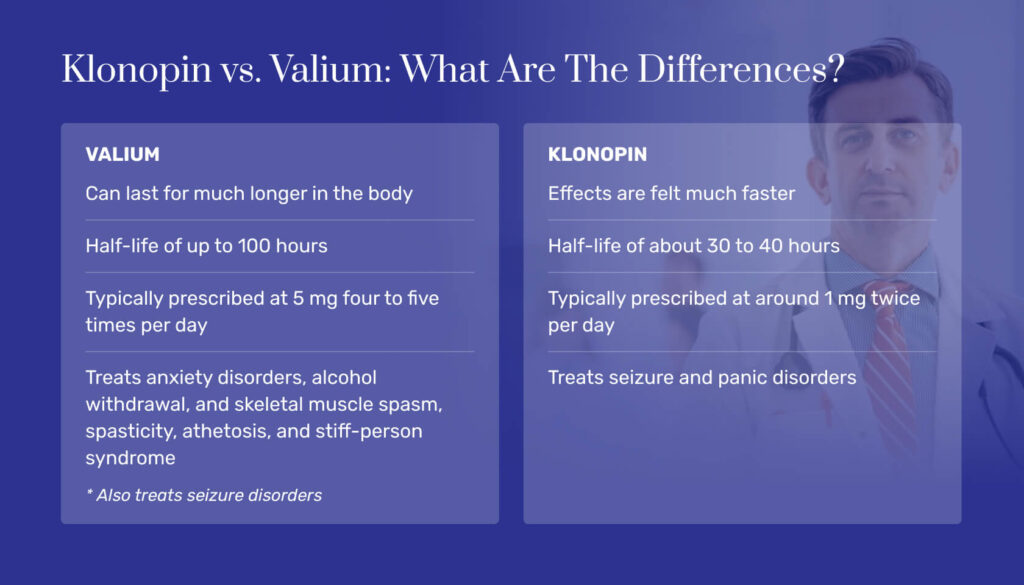The Basics of Klonopin & Valium
You’ve probably heard of both Klonopin and Valium, but what’s the difference? Klonopin is a brand name for the drug clonazepam. Valium is a brand name for the drug diazepam.
Both drugs are benzodiazepines, which calm abnormal overactivity in the brain. Both will generally cause a person to grow calmer, helping them to relax, and both medications share significant overlap in terms of properties and use.
Struggling with Klonopin or Valium Addiction? A Florida addiction treatment center provides compassionate, evidence-based care for benzodiazepine withdrawal and recovery.
How Do These Drugs Work?
Benzodiazepines enhance the effect of a neurotransmitter called GABA-A, which results in their hypnotic, sedative effect. Importantly, both can cause physical dependence if used for too long or not as prescribed, which is why doctors typically avoid prescribing them on a long-term basis when alternative options are available.

Key Differences
While similar, Klonopin and Valium are not identical in the way they’re generally taken and used.
Dosages and Schedules
Klonopin is typically prescribed at around 1 mg twice per day whereas Valium is typically prescribed at 5 mg four to five times per day. Your doctor will determine your specific dosage based on your needs, though.
Use Cases
The drugs also have somewhat different use cases – they can both help with anxiety but there are other conditions they treat too. Klonopin is approved for treating seizure and panic disorders, so those are typically the only reasons you would be prescribed Klonopin.
Valium is approved for treating seizure disorders in addition to anxiety disorders and alcohol withdrawal. It’s also used for skeletal muscle spasm like spasticity (when the muscles become rigid or stiff), athetosis (involuntary writhing movements), and stiff-person syndrome. If you have any of these conditions, you’re more likely to be prescribed Valium, although Klonopin is sometimes used off-label for treating these same conditions.
Unlike Klonopin, Valium is sometimes used in treating seizure disorders, but it isn’t the sole medication used for a person’s treatment.
Is Klonopin or Valium More Effective?
Where the drugs overlap in use cases, there isn’t generally one that is clearly more effective in all scenarios, which is why doctors continue to prescribe both.
One study did find that clonazepam (Klonopin) may be more effective for the treatment of burning mouth syndrome (BMS) as compared to diazepam (Valium).
Another study has suggested clonazepam may be as effective as other benzodiazepines in the treatment of anxiety disorders but with a better safety profile. This would mean it would make a good primary treatment for these problems, with patients only switching to a different benzodiazepine if they cannot take clonazepam for some reason or it proves ineffective.


Valium Addiction Treatment
Is Klonopin or Valium More Addictive?
Both benzodiazepines have the potential to cause physical and psychological dependence, but there doesn’t seem to have been any definitive studies on whether one is significantly more likely to cause a serious problem with dependence than the other.
The drugs do differ in half-life, with Klonopin having a half-life of about 30 to 40 hours and Valium having a half-life of up to 100 hours. This means that Valium stays in your system for longer than Klonopin. While some call Klonopin a long-acting benzodiazepine, it may be more accurate to call it an intermediate-acting benzodiazepine, whereas Valium is definitively long-acting. This doesn’t seem to affect how addictive they are, but it does mean that withdrawal from Valium can take longer.
Safety and Side Effects of Klonopin vs. Valium
Any benzodiazepine can be dangerous if misused, including both Klonopin and Valium. They have a sedative effect and they slow down your breathing. Because of this, they can make your breathing dangerously slow if you take very high doses or if you mix them with other drugs that cause respiratory depression, like opioids or alcohol.
Need support to overcome benzodiazepine dependence? We’re here to help with luxury residential rehab or outpatient treatment for benzo addiction.
Neither drug should ever be taken with any other drug without first talking to a doctor and making sure the combination will be safe, and neither should be taken with alcohol.
As mentioned, both drugs have the potential to cause dependence, meaning a person will experience withdrawal symptoms if they suddenly stop taking them. This is why you should talk to a doctor about quitting benzodiazepines, even if you’ve only ever taken them as instructed, to avoid the potential for withdrawal. Your doctor can help you taper off of them, or medical detox may be an option.
Both Klonopin and Valium are associated with most of the same side effects, including:
Ataxia, a loss of coordination and balance
Depression
Dizziness
Drowsiness
Fatigue
Muscle weakness
Klonopin is also associated with potentially causing upper respiratory infections, which Valium is not.
Which Drug is Better, Klonopin or Valium?
Neither drug is not definitively “better” than the other. As is true when comparing most medications that have been relatively well researched, both medications clearly have use cases, some of which the other benzodiazepine cannot work as a replacement for. Additionally, some people may react better to one benzodiazepine than the other.
As for which medication best fits your needs, that is a discussion that should be had with a medical professional. Your doctor can determine the best option for you based on factors like:
Your specific symptoms and goals
Your medical history and lifestyle habits
Whether you’ve taken either of the medications before and how your body reacted to them
Any other medications you’re taking that could interact with one drug or the other
If you want to know if either Valium or Klonopin might be a better fit than the other, ask your doctor, and they can likely explain the benefits and drawbacks of their recommendation.
The Verdict: Choosing Between Klonopin and Valium
Klonopin and Valium are both benzodiazepines, but they differ in their uses, duration of effects, and potential side effects. Misusing either medication can lead to dependence and serious health risks. If you or someone you love is struggling with benzodiazepine misuse, seek professional help for a safe path to recovery. An Indiana detox center provides long-term residential treatment programs that address both the physical and psychological aspects of benzo addiction.
According to an article by Patricia Weiser, PharmD, Klonopin is generally considered to be “stronger” than Valium because it’s more potent and stays in your body longer. Valium, on the other hand, will start working more quickly than Klonopin does. With either medication, your doctor can determine the dosage that will have the strength you need.
It’s not uncommon for a doctor to switch you from one benzo to another, either because they think you’ll respond better to a different one or because you’re having side effects from the one you’re taking. It’s important not to try to make the switch on your own, though. Your doctor will create a specific plan for the switch based on your needs, which might mean tapering off the Valium slowly before starting you on Klonopin.
The short answer is yes. You can become chemically dependent on either Klonopin or Valium, which is why your doctor will taper your doses in a very particular way if you ever need to stop taking them. You can also develop an addiction to either drug, especially if you’re taking them excessively or differently than they were prescribed.
- Benzodiazepine Addiction. UCLA Jane & Terry Semel Institute for Neuroscience & Human Behavior.
- Clonazepam (Klonopin). (September 2021). National Alliance on Mental Illness.
- Comparison of Treatment Modalities in Burning Mouth Syndrome. (December 2009). Australian Dental Journal.
- Diazepam. (May 2021). National Library of Medicine.
- Klonopin vs. Valium: Differences, Similarities, and Which Is Better for You. (May 2020). SingleCare Administrators.
- Benzodiazepines for Anxiety Disorders: Maximising the Benefits and Minimising the Risks. (January 2018). Advances in Psychiatric Treatment.
- The Efficacy and Safety of Clonazepam in Patients With Anxiety Disorder Taking Newer Antidepressants: A Multicenter Naturalistic Study. (May 2016). Clinical Psychopharmacology and Neuroscience.
- Benzodiazepine Pharmacology and Central Nervous System–Mediated Effects. (Summer 2013). The Ochsner Journal.
- Klonopin vs. Valium: How Do They Compare? Patricia Weiser, PharmD. Very Well Health. Accessed March 31st, 2025.
- Can We Switch from Valium to Klonopin to Treat Panic Attacks Effectively? Humble Family Practice. Accessed March 31st, 2025.
















